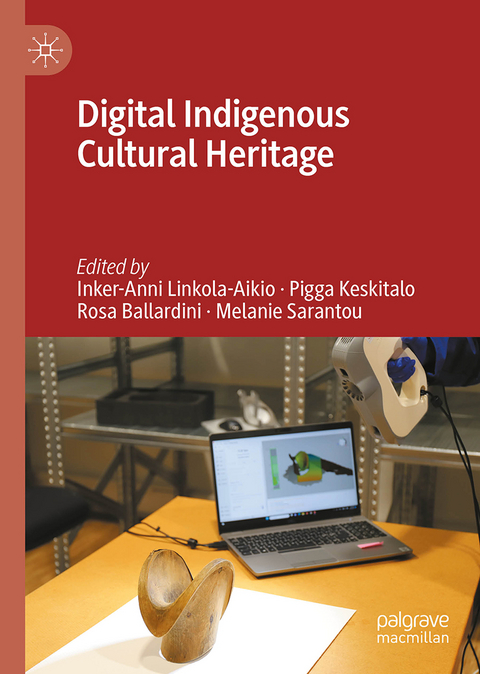
Digital Indigenous Cultural Heritage
Springer International Publishing (Verlag)
978-3-031-76940-5 (ISBN)
- Noch nicht erschienen - erscheint am 03.03.2025
- Versandkostenfrei
- Auch auf Rechnung
- Artikel merken
The digitising of Indigenous cultural heritage (CH) is not often debated in international research. A topical gap in research-based knowledge on the legal and ethical practices of various fields of Indigenous CH exists, for example, regarding digitisation, education, law, social processes, and creative practices. This anthology results from a project aimed at juxtaposing southern and northern perspectives on sustainable practices for digitising indigenous CH. The book seeks to raise awareness, thoroughly discuss the digitisation of CH from a multidisciplinary perspective, and, in this way, disseminate research findings that elaborate on the topic of creating trust in digitising Indigenous CH. The objective is to provide a holistic understanding of key challenges and propose potential novel, workable, substantive, and methodological solutions via which to navigate the legal and cultural tensions within the processes of digitising Indigenous CH in ethical ways.
Inker-Anni Linkola-Aikio is a postdoctoral researcher at the University of Lapland, Finland. Her research interests are language policy, linguistic landscape, Sami language in education, Indigenous archives and cultural heritage education.
Pigga Keskitalo is a professor of education specialising in Arctic perspectives at the Faculty of Education, University of Lapland, Finland. Her research interests include Sami education, Sami language teaching, linguistically responsive teaching, Indigenous curriculum and Indigenous school history.
Rosa Maria Ballardini is a professor of intellectual property law at the Faculty of Law of the University of Lapland, Finland. Her research interests focus on the interface between law, technology and sustainability, including issues related to law as a tool to foster inclusion and participation in decision-making processes.
Melanie Sarantou is a professor of social design at the Faculty of Design of Kyushu University, Japan, as well as an adjunct professor at the University of Lapland, Finland. Her interests span the role of improvisation in arts and design practices when the unsuspected emerges. Her recent research explores how the arts can mitigate societal challenges.
Chapter 1: Introduction.- Part I: Integrating Indigenous Values and Concepts into Digital Cultural Heritage Initiatives.- Chapter 2: The Three-Dimensional Revolution in Sápmi: Decolonizing Emergent Technological Domains for Sustainable Museum Futures.- Chapter 3: Sámi Art: A Multi-perspective Take on the Urgency of Situated Digital Communication.- Chapter 4: Sáme Film Archive in the Digital Age: Challenges and Opportunities in Creating Metadata.- Chapter 5: Samifying Archival Practices and Digitising Sami Duojár Archives with the Slow Archiving Method.- Chapter 6: Preserving the Past, Envisioning the Future: Indigenous Game Design and Digital Cultural Heritage.- Chapter 7: Indigenous Communities Re-interpreting and Preserving Cultural Heritage through Narratives While Navigating the Digital Age.- Chapter 8: Indigenous Peoples and Ethical Guidelines: Are Law and Ethics in Conflict in the Age of Digitalisation?.- Chapter 9: Participatory Approaches to Ethical Design with Indigenous Cultural Heritage in the Digital Age.- Chapter 10: Addressing the Empowerment Divide for the Successful Digitalisation of Indigenous Cultural Heritage.- Part II: Legal Perspectives on Indigenous Rights.- Chapter 11: Indigenous Peoples' Participation and the Creation of Databases Managed by the Intellectual Property Rights Office in Peru.- Chapter 12: The Digitalisation of Indigenous Cultural Heritage in Transitional Contexts: The case of Colombia.- Chapter 13: How Does International Human Rights Law Respond to Indigenous Peoples' Rights to Culture?.- Chapter 14: European Standard for Public Domain and Sustainable Use of Intangible Cultural Heritage.- Part III: Integrating Digital Educational Resources into the Sharing of Indigenous Knowledge.- Chapter 15: Sami Cultural Heritage Institutions' Insights into Education and Digitalisation.- Chapter 16: Digitalised Indigenous Cultural Heritage in Higher Education Institutions: The Need for Non-academic Perspectives.- Chapter 17: Exploring Trust and Design through the Indigenous Medicine Wheel.- Chapter 18: Documenting Wixárika Oral Knowledge with Young People Using Traditional and Digital Technologies in Art Workshops.- Part IV: Future Outlook.- Chapter 19: Indigenous Digital Cultural Heritage, Intellectual Property Rights and Indigenous Worldviews: Renewed Engagement as a Way Forward.
| Erscheint lt. Verlag | 3.3.2025 |
|---|---|
| Zusatzinfo | XV, 269 p. 27 illus., 12 illus. in color. |
| Verlagsort | Cham |
| Sprache | englisch |
| Maße | 148 x 210 mm |
| Themenwelt | Geisteswissenschaften ► Geschichte ► Hilfswissenschaften |
| Geschichte ► Teilgebiete der Geschichte ► Kulturgeschichte | |
| Sozialwissenschaften ► Kommunikation / Medien ► Medienwissenschaft | |
| Schlagworte | Art and Design • digitisation • ethics • Indigenous cultural heritage • law and regulation |
| ISBN-10 | 3-031-76940-6 / 3031769406 |
| ISBN-13 | 978-3-031-76940-5 / 9783031769405 |
| Zustand | Neuware |
| Informationen gemäß Produktsicherheitsverordnung (GPSR) | |
| Haben Sie eine Frage zum Produkt? |
aus dem Bereich


